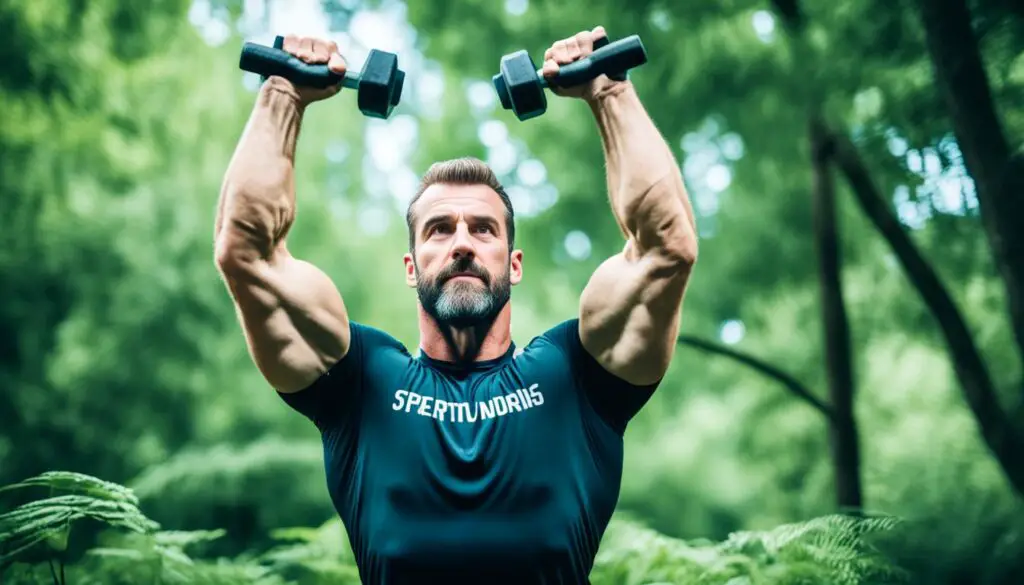As a busy professional, you might feel your energy and libido dropping as you get older. This could be due to lower testosterone levels. Testosterone is key for your health and mood, from building muscles to feeling good. While it naturally goes down with age, you can boost it naturally without supplements.
This article will cover why testosterone matters, what happens if levels drop, and how to increase yours naturally. You’ll learn simple, science-supported tips to boost your testosterone. Get ready to feel more energetic, perform better, and improve your health by changing your lifestyle.
Key Takeaways
- Testosterone is a vital hormone that affects many aspects of health and well-being.
- Testosterone levels naturally decline with age, but can be boosted naturally through lifestyle changes.
- Strategies like strength training, a balanced diet, and stress management can help increase testosterone levels.
- Certain nutrients and supplements may also support healthy testosterone production.
- Addressing low testosterone is important for maintaining physical and mental health as you age.
What is Testosterone and Why is it Important?
Testosterone is a key hormone for both men and women’s health. It’s made in the testes and ovaries. It helps with muscle growth, voice changes, and hair growth during puberty.
Testosterone and its Role in Male and Female Health
As adults, testosterone affects many health aspects. It helps with sexual function, bone strength, and overall health. Testosterone levels are much higher in those assigned male at birth than in those assigned female at birth. Doctors may use synthetic testosterone for certain health issues. It’s also used in hormone therapy for those transitioning to male.
Effects of Low Testosterone Levels
Low testosterone can cause problems like less muscle, feeling tired, and less sexual function. Symptoms in adults assigned male at birth include losing muscle, gaining body fat, feeling sad, trouble with erections, osteoporosis, and memory problems. High testosterone can come from PCOS, congenital adrenal hyperplasia, and some tumors.
“If you suspect abnormal testosterone levels, it is advisable to consult a healthcare provider for tests.”

The hypothalamus, pituitary gland, and gonads control testosterone levels. Blood tests can measure these levels. Knowing about testosterone’s role and its imbalances is key for good health.
How to Boost Testosterone Naturally: Easy Tips & Tricks
Keeping your testosterone levels healthy is key for your overall health, especially for men. There are many natural ways to boost testosterone without using risky supplements or drugs. Let’s look at some easy changes in your life that can help you get more testosterone naturally.
Exercise and Lift Weights
Regular exercise, especially resistance training and high-intensity interval training (HIIT), can greatly improve your testosterone levels. Studies show that just one week of restricted sleep can reduce daytime testosterone levels by up to 15%. Adding strength exercises like weightlifting to your routine can boost this important hormone.
Optimize Your Diet
What you eat affects your testosterone levels too. Eat a diet full of protein, healthy fats, and complex carbs. Men who are obese tend to have 30% lower testosterone levels compared to their leaner counterparts. Stay away from crash diets and eat foods that are full of nutrients to help your hormones.
Manage Stress and Cortisol Levels
Too much stress can lower your testosterone by making more cortisol. To fight this, try stress-reducing activities like meditation, yoga, or deep breathing. Chronic alcohol use and certain medications, such as statins, can also lower testosterone levels.
Optimize Vitamin D Intake
Vitamin D is key for healthy testosterone levels. Research has linked low vitamin D levels to decreased testosterone production. Get enough sun or take a good vitamin D supplement to help your hormones stay balanced.
By adding these easy tips to your life, you can naturally increase your testosterone. This can lead to more energy, more muscle, and better sexual function.

Exercise and Lift Weights
Regular exercise, like resistance training and high-intensity interval training (HIIT), can boost your testosterone levels naturally. Resistance training, which includes weightlifting, increases testosterone in both men and women. This boost can last up to an hour after a workout.
Resistance Training and High-Intensity Interval Training
Strength training raises testosterone levels in men, especially in the evening. Resistance training with exercises like squats, rows, and chest presses helps release testosterone.
HIIT, which mixes intense exercise with rest, also boosts testosterone in men. But for women, it might lower testosterone levels.
Other factors like diet, stress, and sleep quality affect testosterone levels too. Eating well, managing stress, and getting enough sleep are key to boosting testosterone naturally.
| Exercise Type | Impact on Testosterone Levels |
|---|---|
| Resistance Training | Significant short-term increase in testosterone for both men and women |
| High-Intensity Interval Training (HIIT) | Increases testosterone in men, but can decrease it in women |
| Endurance Training (e.g., Cardio) | No significant impact on testosterone levels, and may even lower them in some cases |
“Strength training has a bigger effect on boosting testosterone levels compared to endurance training or cardio.”
Eat a Balanced Diet with Protein, Fat, and Carbs
Your diet is key to keeping your testosterone levels healthy. Eating the right mix of protein, healthy fats, and complex carbs helps your body make testosterone.
Protein-rich foods like lean meats, fish, eggs, and soy are vital for testosterone. Healthy fats in nuts, avocados, and fatty fish also help balance testosterone.
Complex carbs in whole grains, veggies, and some fruits keep your blood sugar stable. This helps keep your testosterone levels steady. Eating a nutritious diet improves your hormone balance and health.
- A study showed that a low-fat, high-fiber diet led to decreased levels of testosterone.
- Research indicated that following a diet balanced in carbohydrates and protein resulted in higher testosterone levels in the high-carb diet group compared to the high-protein diet group.
- A study revealed that dietary zinc restriction was associated with lower testosterone levels in healthy men.
- Magnesium was found to be significantly and positively correlated with testosterone levels in men.
Vitamin D deficiency was associated with lower testosterone levels, and supplementation increased testosterone levels in men with a deficiency.
“Obesity is linked to decreased testosterone levels, emphasizing the importance of maintaining a healthy weight for normal hormone production.”
By eating a balanced diet with the right macronutrients, you support your body’s testosterone production and health.
Minimize Stress and Cortisol Levels
Chronic stress and high cortisol levels can harm testosterone production. Cortisol and testosterone balance each other out, where more cortisol means less testosterone. Stress can also lead to weight gain and insulin resistance, which lowers testosterone levels. It’s key to manage stress well to keep testosterone levels healthy.
Stress Management Techniques
Regular exercise, enough sleep, and relaxation methods like meditation or deep breathing can lower stress and cortisol. A 2019 study found eating more carbs can also help reduce cortisol. A small 2019 study showed Omega-3 fatty acids can lower cortisol in nurses feeling burnout.
A double-blind study in 2019 showed ashwagandha supplements can cut down cortisol, especially in the morning. But, always talk to a doctor before taking supplements because they can affect health conditions.
Reducing stress means lowering cortisol levels. Doing tasks in order, managing stress, and getting mental health help are good ways to do this. Research has shown having a pet can also lower stress in kids during stressful tests with their dogs.
Laughter, hobbies, strong relationships, and pets can all help lower cortisol and improve well-being. A 2019 study found smoking affects cortisol and sleep, showing the need for a healthy lifestyle.
Exercise can also help with cortisol levels. Low- or moderate-impact exercises are good, but intense exercise can raise cortisol because it stresses the body more.
Using good stress management and living healthily can reduce stress, lower cortisol, and support testosterone production. This is key for good health and well-being.
How to boost testosterone naturally
Lifestyle changes like diet, exercise, and managing stress are key to boosting testosterone. But, some supplements and herbal remedies can also help. Let’s look at some good options.
Supplements and Herbal Remedies for Testosterone Boost
Supplements for Testosterone
- Zinc is crucial for making testosterone. Studies show that zinc supplements can raise testosterone levels, especially in those who lack it.
- Vitamin D is vital for testosterone too. A study found that men taking 3,300 IU of vitamin D daily saw a 20% increase in testosterone.
- DHEA supplements have been proven to boost testosterone in both men and women.
Herbs for Testosterone Boost
- Saw Palmetto, Ginger, and Ashwagandha are herbal remedies that might help boost testosterone. But, we need more research.
Before starting any supplements, talk to a healthcare professional. This is crucial if you have health issues or are on other meds.
“Keeping testosterone levels healthy is key for overall well-being. Luckily, there are natural ways to support your body.”
Conclusion
Keeping your testosterone levels healthy is key for your overall health. As you get older, testosterone levels drop. But, you can boost them naturally. A balanced lifestyle with exercise, a healthy diet, stress management, and supplements can help.
This article has shown how important testosterone is for both men and women. It talked about the effects of low testosterone and how to increase it naturally. You learned about the role of exercise, diet, stress management, and supplements in boosting testosterone.
Remember, improving testosterone levels is a journey. Making lasting lifestyle changes and getting advice from health experts can help. Follow these tips, stay committed, and start your journey to better health and higher testosterone levels.



